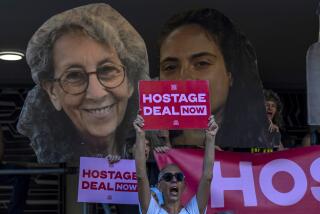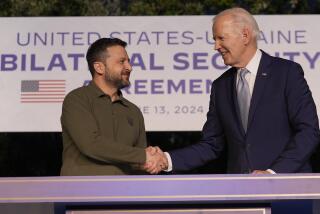Iran nuclear deal negotiators finish preliminary talks
WASHINGTON — Negotiators for Iran and six world powers said Wednesday that they have completed preliminary discussions on Iran’s disputed nuclear program and are dashing to finish a long-term comprehensive agreement by July 20.
Wrapping up two days of talks in Vienna, the negotiators said they would meet next month to draft a final deal in hope of reaching an accord before the midsummer deadline.
The results are hardly assured because the process will entail difficult decisions on a number of contentious issues.
“We have now held substantive and detailed discussions covering all the issues which will need to be part of” the final deal, Iranian Foreign Minister Mohammad Javad Zarif and European Union foreign policy chief Catherine Ashton said in a joint statement.
They said they would aim to bridge “the gaps in all the key areas” in upcoming meetings. “A lot of intensive work will be required to overcome the differences which naturally still exist at this stage in the process.”
The six powers — the five permanent members of the United Nations Security Council plus Germany — are seeking a comprehensive agreement that will allow Iran to continue limited nuclear enrichment and research, but that will guarantee it does not gain a capability to build nuclear weapons.
Iran, in turn, seeks to escape a punishing yoke of international sanctions that have crippled its economy over the last decade. It says its nuclear activities, including uranium enrichment, are for civilian purposes.
The two sides reached an interim agreement in November that required Iran to scale back or halt advanced elements of its nuclear program in exchange for a modest easing of sanctions. The deal provided six months for further negotiations, a period that ends July 20.
Iran and the so-called P5-plus-1 group could agree to extend talks for six months. But both sides worry that political opponents in Tehran and Washington could undermine further negotiations.
The next round of talks is scheduled to begin May 13 in Vienna.
Zarif said he was confident negotiators could complete the deal by the July deadline. A Chinese official, Wang Qun, told reporters in Vienna that all sides “seem to be very sincere and very genuine in their efforts,” the Reuters news agency reported.
A senior Obama administration official who briefed reporters Friday expressed optimism about reaching a deal. But Secretary of State John F. Kerry seemed less certain Tuesday, telling a congressional committee that he was “agnostic” on the prospects.
To reach a comprehensive deal, negotiators must agree on limits to Iran’s enrichment of uranium and whether portions of its nuclear infrastructure must be dismantled or altered, including the heavy-water reactor in Arak, which the West worries could produce plutonium for a nuclear bomb. They also will have to hammer out a timetable for phasing out sanctions on Iran’s energy, financial, trade and other sectors.
The two sides remain far apart on how long the final deal should remain in effect. Iran is seeking a deal that expires in a few years at most, while Washington and its allies prefer that any constraints on Iran’s nuclear program be enforced for decades.
Iran’s supreme leader, Ayatollah Ali Khamenei, signaled on Wednesday that he wants negotiations to continue, but indicated he will not accept compromises.
In a speech in observance of the country’s “national nuclear day,” Khamenei said, “Everybody should know that although negotiations are going on, [Iran’s] activities in the field of nuclear research and development will never stop and none of Iran’s nuclear achievements will be shut down.”
Joel Rubin, a former State Department official at the Ploughshares Fund, an arms control advocacy group, said Khamenei’s comments “would not make [the] job any easier” for Iran’s negotiators.
Rubin said the negotiators will write their draft agreement with a keen awareness that any compromises must be accepted in capitals where critics are concerned that their side is about to receive a poor deal.
“This will ultimately be decided in Washington and Tehran,” he said.
Times staff writer Richter reported from Washington and special correspondent Mostaghim from Tehran.
More to Read
Sign up for Essential California
The most important California stories and recommendations in your inbox every morning.
You may occasionally receive promotional content from the Los Angeles Times.











